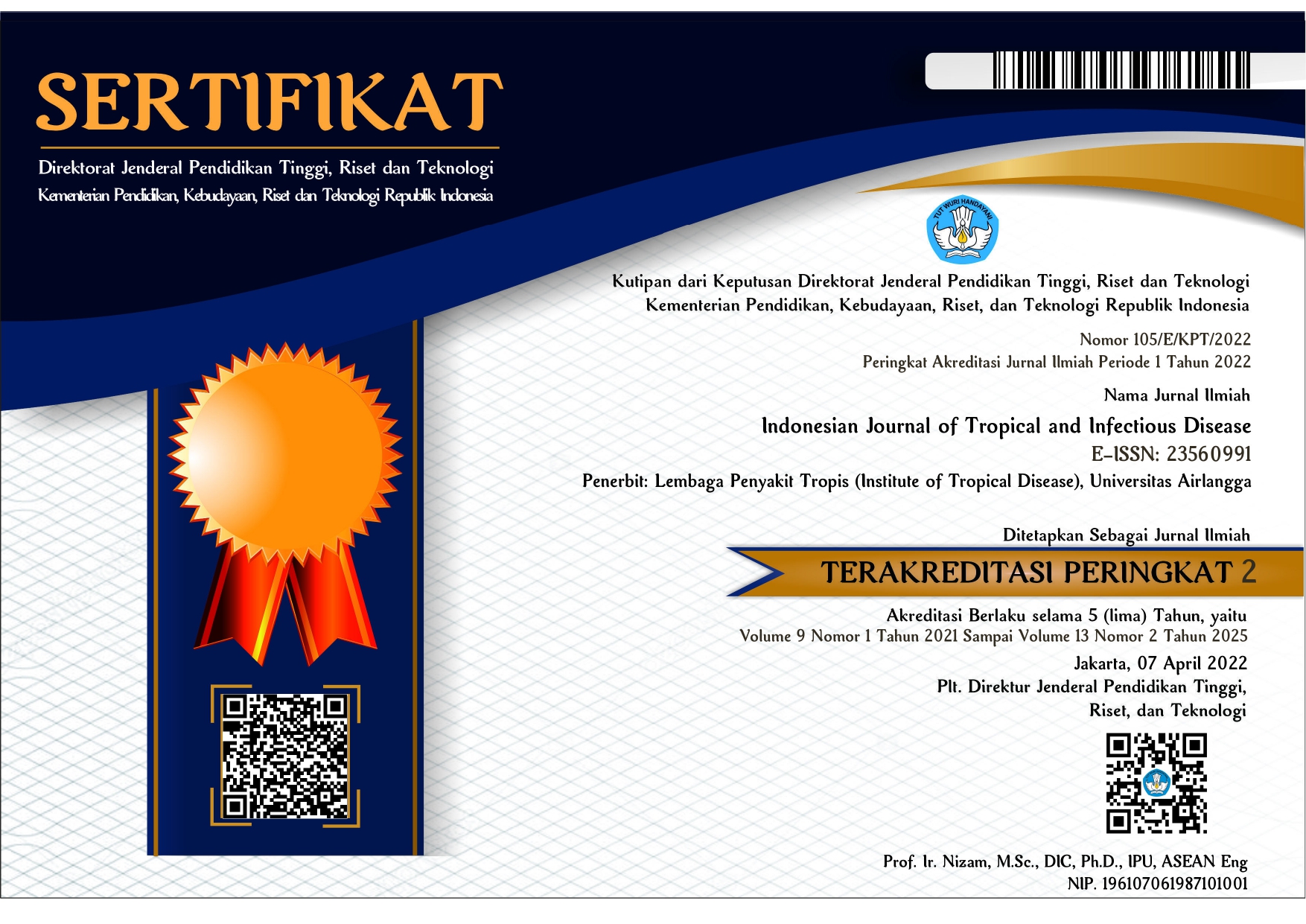DETECTION OF TUMOR NECROSIS FACTOR- (TNF- ) GENE PROMOTERS POLYMORPHISM AMONG LIVER CIRRHOSIS PATIENTS WITH CHRONIC HEPATITIS B VIRUS (HBV) INFECTION IN SURABAYA, INDONESIA
Downloads
Polymorphisms in TNF-α gene promoter region are known of its role in the production of TNF-α which may influences the pathogenesis of liver disease. SNPs in positions 238 and 308 of TNF-α gene promoters may affect the production of these cytokines. This study was aimed to detect Single Nucleotide Polymorphism (SNP) on -238 and -308 positions in the TNF-α gene promoter among liver cirrhosis patients with HBV infection in Surabaya, Indonesia. This was descriptive exploratory research with cross sectional study design using serum liver cirrhosis patients with HBV infection in Endoscopy Outpatient Clinic Dr. Soetomo General Hospital, Surabaya from April-May 2017. SNPs at -238 and -308 on TNF-α gene promoter (rs361525 and rs1800629 respectively) were detected using Polymerase Chain Reaction-Restriction Fragment Length Polymorphism (PCR-RFLP) with primers specific for the TNF-α promoter region and restriction enzymes NcoI and MspI. The genotypes of TNF-α gene promoter were assessed according to the length of the fragments produced in RFLP. Serum TNF-α levels was measured by commercial ELISA. In this study, as much as 149 positive HBsAg patients was found in Endoscopy Outpatient Clinic, Dr. Soetomo General Hospital, Surabaya. From those amount, as much as 30 liver cirrhosis patients with positive HBsAg were obtained. From 2/30 (6.7%) patients showed the GA heterozygote SNP either position -238 or -308. No patient had the AA genotype. Median blood TNF-α level in women (38 ng / L) was higher than in men (33 ng / L). TNF-α levels in patients with GA heterozygote genotype at -238 and -308 in this research was not different than wild-type (GG genotype). Among patients with liver cirrhosis due to chronic HBV infection in Surabaya, Indonesia, Surabaya, we found GA polymorphisms the TNF-α promoter gene at positions -238 and -308 in 6.7% patients, and did not find homozygous AA polymorphisms. Further studies including larger numbers of patients from various ethnic backgrounds in Indonesia are needed to provide robust data on TNF-α gene promoter polymorphisms and their role in the pathogenesis of liver cirrhosis with HBV infection in this country.
Yano Y, Utsumi T, Lusida MI, Hayashi Y. Hepatitis B virus infection in Indonesia. World J Gastroenterol. 2015;21(38):10714–20.
EASL. EASL 2017 Clinical Practice Guidelines on the management of hepatitis B virus infection. J Hepatol. 2017;67(2):370–98.
Mathew S, Abdel-Hafiz H, Raza A, Fatima K, Qadri I. Host nucleotide polymorphism in hepatitis B virus associated hepatocellular carcinoma. World J Hepatol. 2016;8(10):485–98.
Zeng Z. Human genes involved in hepatitis B virus infection. World J Gastroenterol. 2014;20(24):7696–706.
Balmasova IP, Yushchuk ND, Mynbaev OA, Alla NR, Malova ES, Shi Z. Immunopathogenesis of chronic hepatitis B. World J Gastroenterol. 2014;20(39):14156–71.
Seki E, Schwabe RF. Hepatic Inflammation and Fibrosis: Functional Links and Key Pathways. Hepatology. 2015;61(3):1066–79.
Farid S, Rashid L, Swelam S. Tumour Necrosis Factor-Alpha Gene Expression in Chronic Hepatitis C Virus Infection . Egypt J Hosp Med. 2013;51(April):395–404.
Li X, Liang C, Parkman V, Lv Z. The association between TNF- a 238A/G and 308A/G polymorphisms and juvenile idiopathic arthritis. Medicine (Baltimore). 2018;97(43):1–11.
Jamil K, Jayaraman A, Ahmad J, Joshi S, Yerra SK. TNF-alpha -308G/A and -238G/A polymorphisms and its protein network
associated with type 2 diabetes mellitus. Saudi J Biol Sci [Internet]. 2016;1–9. Available from: http://dx.doi.org/10.1016/j. sjbs.2016.05.012
Abbas AK, Lichtman AH, Pillai S, Baker DL, Baker A. Cellular and Molecular Immunology. 8th ed. Philadelphia: Elsevier Saunders; 2015.
Schwabe RF. Mechanisms of Liver Injury. I. TNF-Alpha-induced liver injury: role of IKK, JNK, and ROS pathways. AJP Gastrointest Liver Physiol [Internet]. 2006;290(4):G583–9. Available from: http:// ajpgi.physiology.org/cgi/doi/10.1152/ajpgi.00422.2005
Mourtzikou A, Alepaki M, Stamouli M, Pouliakis A, Skliris A, Karakitsos P. Evaluation of serum levels of IL-6, TNF-alpha, IL-10, IL-2 and IL-4 in patients with chronic hepatitis. Inmunología. 2014;33(2):41–50.
Bobek V, Kolostova K, Pinterova D, Kacprzak G, Adamiak J, Kolodziej J, et al. A clinically relevant, syngeneic model of spontaneous, highly metastatic B16 mouse melanoma. Anticancer Res. 2010;30(12):4799–804.
Lee SS, Byoun Y-S, Jeong S-H, Kim YM, Gil H, Min B-Y, et al. Type and cause of liver disease in Korea: single-center experience, 2005-2010. Clin Mol Hepatol. 2012;18:309.
Başyigit S, Asiltürk Z, Sapmaz F, Kefeli A, Yeniova AÖ, Uzman M, et al. Hepatitis B virus is still the most common etiologic factor of liver cirrhosis: Results from a single center in Turkey. Dicle Med J / Dicle Tip Derg [Internet]. 2015;42(4):416–21. Available from: http:// dergipark.gov.tr/doi/10.5798/diclemedj.0921.2015.04.0601
Brady CW. Liver disease in menopause. World J Gastroenterol. 2015;21(25):7613–20.
Wang B, Wang J, Zheng Y, Zhou S, Zheng J, Wang F, et al. A study of TNF-alpha-238 and -308 polymorphisms with different outcomes of persistent hepatitis B virus infection in China. Pathology [Internet]. 2010;42(7):674–80. Available from: http://www.ncbi.nlm.nih.gov/ pubmed/21080879
Xie HY, Wang WL, Yao MY, Yu SF, Feng XN, Jin J. Polymorphisms in Cytokine Genes and Their Association with Acute Rejection and Recurrence of Hepatitis B in Chinese Liver Transplant Recipients. Arch Med Res. 2008;39:420–8.
Sghaier I, Zidi S, Mouelhi L, Dabbech R, Ghazouani E, Brochot E, et al. The relationship between TNF alpha gene polymorphisms (-238/-308), TNF RII VNTR (p75) and outcomes of hepatitis B virus
infection in Tunisian population. Gene [Internet]. 2015;568(2):140–5. Available from: http://dx.doi.org/10.1016/j.gene.2015.05.029
Basturk B, Karasu Z, Kılıc M, Ulukaya S. Association of TNF- a í€ 308 polymorphism with the outcome of hepatitis B virus infection in Turkey. Infect Genet Evol. 2008;8:20–5.
Luo M, Yang Y, Luo D, Liu L, Zhang Y, Yang J, et al. Tumor necrosis factor-alpha promoter polymorphism 308 G / A is not significantly associated with esophageal cancer risk: a Literature search. Oncotarget. 2016;7(48).
Aroucha DC, Carmo RF, Silva LRV, Lima RE, Mendonca Furtado T, Arnez LE, et al. TNF-a and IL-10 Polymorphisms Increase the Risk to Hepatocellular Carcinoma in HCV Infected Individuals. J Med Virol. 2016;88(9):1587–95.
Xia Q, Zhou L, Liu D, Chen Z, Chen F. Relationship between TNF-alpha Gene Promoter Polymorphisms and Outcomes of Hepatitis B Virus Infections: A Meta-Analysis. PLoS One. 2011;6(5):1–8.
Banday MZ, Balkhi HM, Hamid Z, Sameer AS, Chowdri NA, Haq E. Tumor necrosis factor-Alpha (TNF-Alpha)-308G/A promoter polymorphism in colorectal cancer in ethnic Kashmiri population - A case control study in a detailed perspective. Meta Gene [Internet]. 2016;9:128–36. Available from: http://dx.doi.org/10.1016/j. mgene.2016.06.001
Mathar NRS. Hubungan Polimorfisme Gen Tumor Necrosis Factor Alpha (TNF-Αlpha) Dengan Akne Vulgaris Ringan Di Makassar [Internet]. 2011 [cited 2017 Nov 7]. Available from: http://med.unhas. ac.id/ikkk/?p=273
Tarigan AP, Syafiuddin T, Yunus F, Suradi. Association of Tumor Necrosis Factor Alpha and Lymphotoxin Alpha Gene Polymorphisms with the Presence of Chronic Obstructive Pulmonary Disease. Acta Medica Indones - Indones J Intern Med [Internet]. 2015;47(4):283–90. Available from: http://ajrccm.atsjournals.org/content/163/2/420. short
Nurhajjah S, Ratnaningrum SD, Mundhofir FEP, Faradz SM. Polimorfisme Gen TNF-α -308 G>A pada Penderita Sindrom Down. MKA. 2014;37(1):44–9.
Zhuang L, Ma W, Cai D, Zhong H, Sun Q. Associations between tumor necrosis factor-α polymorphisms and risk of psoriasis: A meta-analysis. PLoS One. 2013;8(12):1–7.
Baghel K, RN S, A C, J A, HR K. TNF-alpha, IL-6 and IL-8 cytokines in relation to TNF-alpha-308 G/A polymorphism in postoperative sepsis [Internet]. Vol. 15, Surgical Infections. 2014. p. S11--S12. Available from: http://ovidsp.ovid.com/ovidweb.cgi?T=JS%7B&% 7DPAGE=reference%7B&%7DD=emed12%7B&%7DNEWS=N% 7B&%7DAN=71437581
Marotte H, Arnaud B, Diasparra J, Zrioual S, Miossec P. Association between the level of circulating bioactive tumor necrosis factor α and the tumor necrosis factor α gene polymorphism at −308 in patients with rheumatoid arthritis treated with a tumor necrosis factor α inhibitor. Arthritis Rheum [Internet]. 2008;58(5):1258–63. Available from: http://doi.wiley.com/10.1002/art.23430
O'Dwyer MJ, Mankan AK, Ryan AW, Lawless MW, Stordeur P, Kelleher D, et al. Characterization of tumour necrosis factor-alpha genetic variants and mRNA expression in patients with severe sepsis. Int J Immunogenet. 2008;35(4–5):279–85.
Vikram NK, Bhatt SP, Bhushan B, Luthra K, Misra A, Poddar PK, et al. Associations of -308G/A polymorphism of tumor necrosis factor (TNF)-α gene and serum TNF-α levels with measures of obesity, intra-abdominal and subcutaneous abdominal fat, subclinical inflammation and insulin resistance in Asian Indians in north India. Dis Markers. 2011;31(1):39–46.
Scardapane A, Breda L, Lucantoni M, Chiarelli F. TNF-α Polymorphisms in Juvenile Idiopathic Arthritis : Which Potential Clinical Implications? Int J Rheumatol. 2012;2012:1–16.
Vázquez-Huerta DI, Alvarez-Rodríguez BA, Topete-Reyes JF, Muñoz-Valle JF, Parra-Michel R, Fuentes-Ramírez F, et al. Tumor necrosis factor alpha -238 G/A and -308 G/A polymorphisms and soluble TNF-α levels in chronic kidney disease: Correlation with clinical variables. Int J Clin Exp Med. 2014;7(8):2111–9.
Tahan RR El, Ghoneim AM, Mashad N El. TNF-α gene polymorphisms and expression. Springerplus. 2016;5:1508–14.
Arbab M, Tahir S, Niazi MK, Ishaq M, Hussain A, Siddique M, et al. TNF- a Genetic Predisposition and Higher Expression of Inflammatory Pathway Components in Keratoconus. Inflamm Pathw Keratoconus Onset. 2017;58(9):3481–7.
Putri S, Rasmiyyah S, Amalia E, Razari I, Wicaksono BD. Relationship Between TNF-238G > A Polymorphism and Predisposition to Pulmonary Tuberculosis Infection in The Indonesian Population ( A Pilot Study ). J Kedokt Yars. 2015;23(1):1–11.
Copyright (c) 2019 Indonesian Journal of Tropical and Infectious Disease

This work is licensed under a Creative Commons Attribution-NonCommercial-ShareAlike 4.0 International License.
The Indonesian Journal of Tropical and Infectious Disease (IJTID) is a scientific peer-reviewed journal freely available to be accessed, downloaded, and used for research. All articles published in the IJTID are licensed under the Creative Commons Attribution-NonCommercial-ShareAlike 4.0 International License, which is under the following terms:
Attribution ” You must give appropriate credit, link to the license, and indicate if changes were made. You may do so reasonably, but not in any way that suggests the licensor endorses you or your use.
NonCommercial ” You may not use the material for commercial purposes.
ShareAlike ” If you remix, transform, or build upon the material, you must distribute your contributions under the same license as the original.
No additional restrictions ” You may not apply legal terms or technological measures that legally restrict others from doing anything the license permits.























